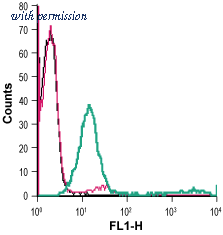product summary
Loading...
company name :
Alomone Labs
product type :
antibody
product name :
Anti-MCT1 (SLC16A1) (extracellular)-FITC Antibody
catalog :
AMT-011-F
clonality :
polyclonal
host :
domestic rabbit
conjugate :
FITC
clone name :
NA
reactivity :
human, mouse, rat
application :
flow cytometry
more info or order :
image
image 1 :

Cell surface detection of monocarboxylate transporter 1 in live intact human Jurkat T-cell leukemia cells: Cell surface detection of monocarboxylate transporter 1 in live intact human Jurkat T-cell leukemia cells: Black line: Cells. Red line: Cells + rabbit IgG isotype control-FITC. Green line: Cells + Anti-MCT1 (SLC16A1) (extracellular)-FITC Antibody (#AMT-011-F), (5 µg).
product information
CAT :
AMT-011-F
SKU :
AMT-011-F_15 mcl
Product Name :
Anti-MCT1 (SLC16A1) (extracellular)-FITC Antibody
Group Type :
Antibodies
Product Type :
Antibodies
Clonality :
Polyclonal
Accession :
P53987
Applications :
FC
Reactivity :
Human Rat Mouse
Host :
Rabbit
Blocking Peptide :
BLP-MT011
Homology :
Mouse, human - identical
Formulation :
PBS pH7.4, 1% BSA with 0.05% sodium azide
isotype :
Rabbit IgG
Peptide confirmation :
Confirmed by amino acid analysis and mass spectrometry
Reconstitution :
15 µl or 50 µl double distilled water (DDW), depending on the sample size.
Antibody Concentration After Reconstitut ... :
1 mg/ml
Storage After Reconstitution :
The reconstituted solution can be stored at 4°C, protected from the light, for up to 1 week. For longer periods, small aliquots should be stored at -20°C. Avoid multiple freezing and thawing. Centrifuge all antibody preparations before use (10000 x g 5 min).
Preservative :
1% BSA, 0.05% NaN3
Immunogen Location :
6th extracellular loop
Label :
Fluorescein isothiocyanate (FITC).
Storage Before Reconstitution :
The antibody ships as a lyophilized powder at room temperature. Upon arrival, it should be stored at -20°C
Shipping and storage :
Shipped at room temperature. Product as supplied can be stored intact at room temperature for several weeks. For longer periods, it should be stored at -20°C
immunogen source species :
Rat
Sequence :
(C)GRLNDMYGDYKYT, corresponding to amino acid residues 403-415 of rat MCT1
Product Page - Scientific background :
Monocarboxylates such as pyruvate, lactate, and ketone bodies play essential roles in carbohydrate, fat, and amino acid metabolism and must be rapidly transported across the plasma membrane of cells. Transport of monocarboxylates is mediated by proton-linked monocarboxylate transporters (MCTs).MCT1 is comprised of 12-transmembrane helices (TMs) with intracellular C- and N-termini and a large cytosolic loop between TMs 6 and 7. The TM regions are more conserved than the loops and C-terminus. MCT1 demonstrates Michaelis Menten kinetics with a broad specificity for short-chain monocarboxylates such as halides, hydroxyl, and carbonyl groups. In addition, the transport of unsubstituted short-chain fatty acids, such as acetate, propionate, and butyrate, is strongly facilitated by MCT1. Natural occurring substrates for MCT1 include L-lactate, pyruvate, β-hydroxybutyrate, and acetoacetate. The predominant role of MCT1 is to facilitate unidirectional proton-linked transport of L-lactate across the plasma membrane. This may result in either influx or efflux of lactic acid depending of the prevailing intracellular and extracellular substrate concentrations and the pH gradient across the plasma membrane. When transporting lactate into the cell, MCT1 has a substrate binding site open to the extracellular matrix which binds a proton first followed by the lactate anion1.MCT1 has been considered as a promising target for cancer therapy, since it facilitates lactate efflux in glycolytic tumors. In breast carcinoma, MCT1 is associated with poor prognostic variables such as basal-like subtype and high grade tumors2.
Applications may also work in :
FC
Supplier :
Alomone Labs
Target :
Monocarboxylate transporter 1, Monocarboxylic acid transporter 1
Short Description :
A Rabbit Polyclonal Antibody to Monocarboxylate Transporter 1 Conjugated to the Fluorescent Dye FITC
Long Description :
Anti-MCT1 (SLC16A1) (extracellular) Antibody (#AMT-011) is a highly specific antibody directed against an epitope of rat Monocarboxylate transporter 1. The antibody can be used in western blot, immunohistochemistry, and indirect live cell flow cytometry applications. It has been designed to recognize MCT1 from rat, mouse, and human samples. Anti-MCT1 (SLC16A1) (extracellular)-FITC Antibody (#AMT-011-F) is directly conjugated to fluorescein isothiocyanate (FITC). The antibody can be used in immunofluorescent applications such as direct live cell flow cytometry.
Negative Control :
RIC-001-F
Positive Control :
NA
Synonyms :
Monocarboxylate transporter 1, Monocarboxylic acid transporter 1
Lead Time :
1-2 Business Days
Country of origin :
Israel/IL
Applications key :
CBE- Cell-based ELISA, FC- Flow cytometry, ICC- Immunocytochemistry, IE- Indirect ELISA, IF- Immunofluorescence, IFC- Indirect flow cytometry, IHC- Immunohistochemistry, IP- Immunoprecipitation, LCI- Live cell imaging, N- Neutralization, WB- Western blot
Specifictiy :
SLC16A1
Form :
Lyophilized powder
Comment :
Contact Alomone Labs for technical support and product customization
Species reactivity key :
H- Human, M- Mouse, R- Rat
Is Toxin :
No
Purity :
Affinity purified on immobilized antigen.
UNSPSC :
41116161
Clone :
NA
Standard quality control of each lot :
Western blot analysis (unlabeled antibody, #AMT-011), and direct flow cytometry (labeled antibody).
Antigen preadsorption control :
1 µg peptide per 1 µg antibody
Application Dilutions: Immunohistochemis ... :
Contact Alomone for information
Application Dilutions: Western blot wb :
Contact Alomone for information
more info or order :
company information

Alomone Labs
Jerusalem BioPark (JBP), Hadassah Ein Kerem
P.O. Box 4287
Jerusalem 9104201
P.O. Box 4287
Jerusalem 9104201
info@alomone.com
http://www.alomone.com972 2 531 8002
headquarters: Israel
related products
browse more products
questions and comments
